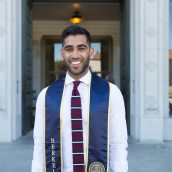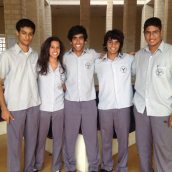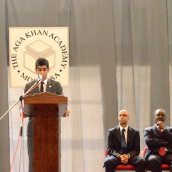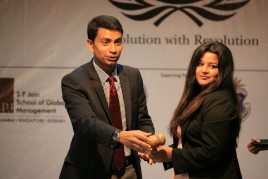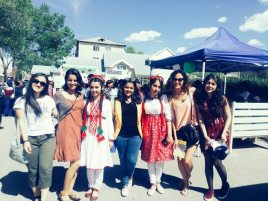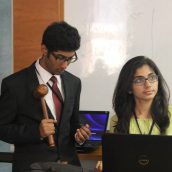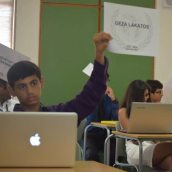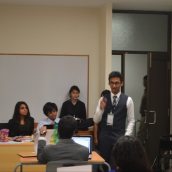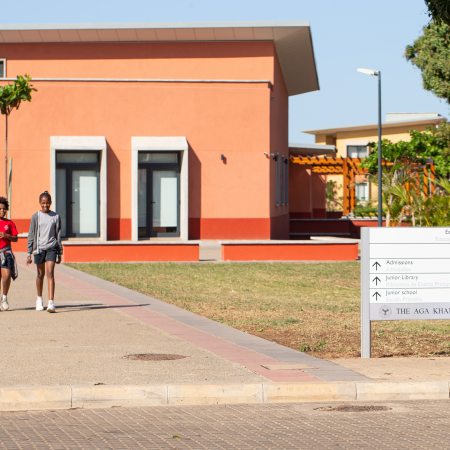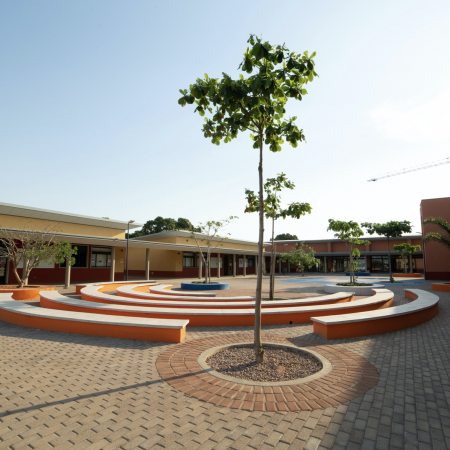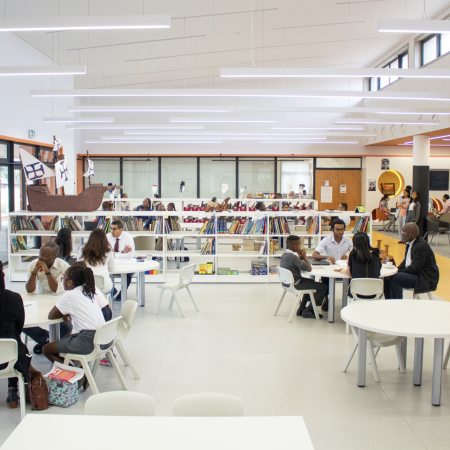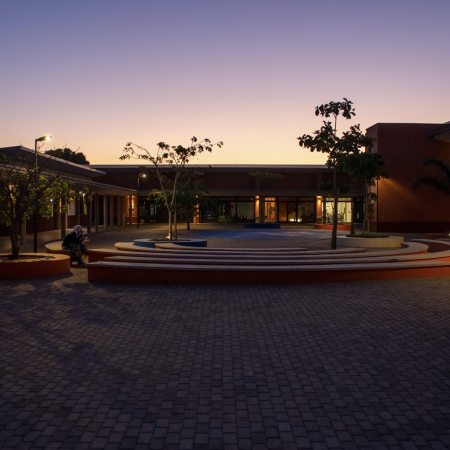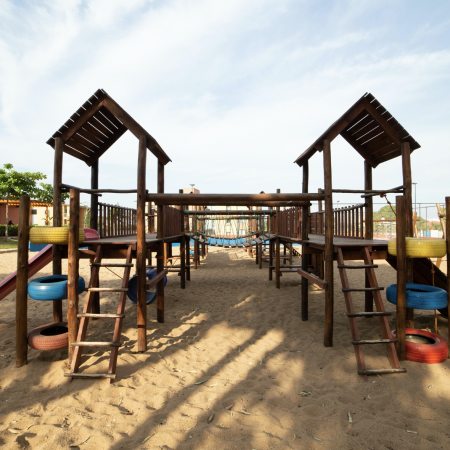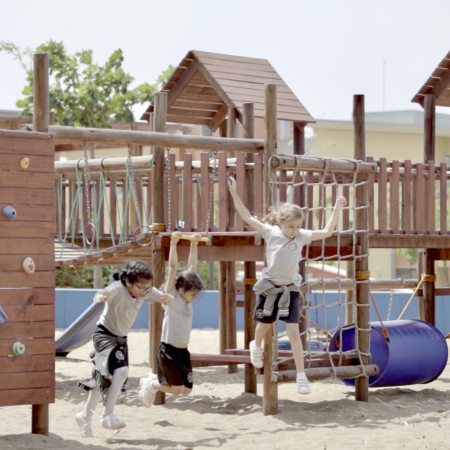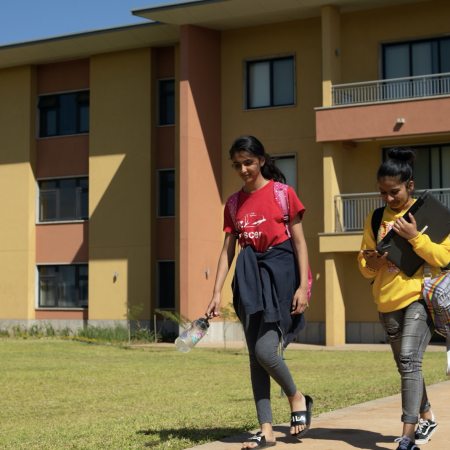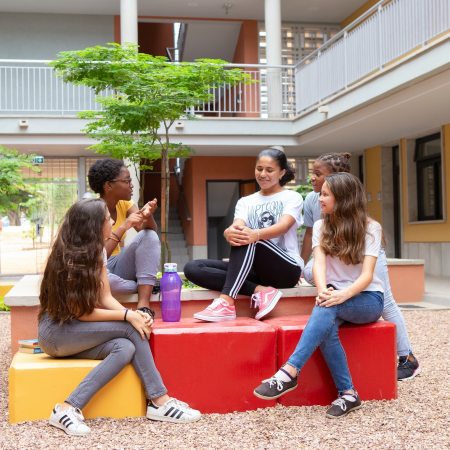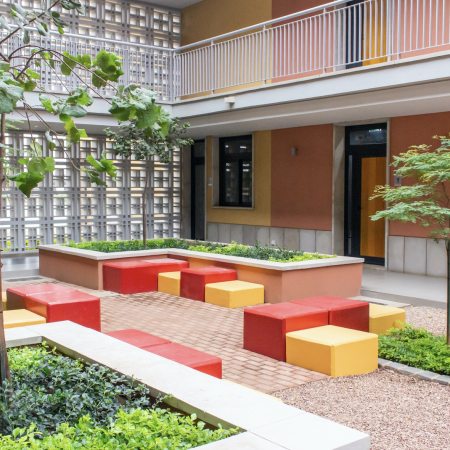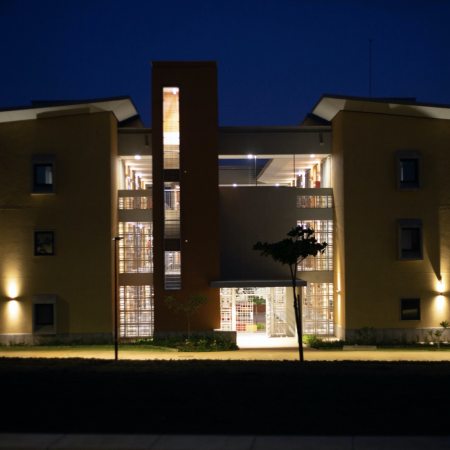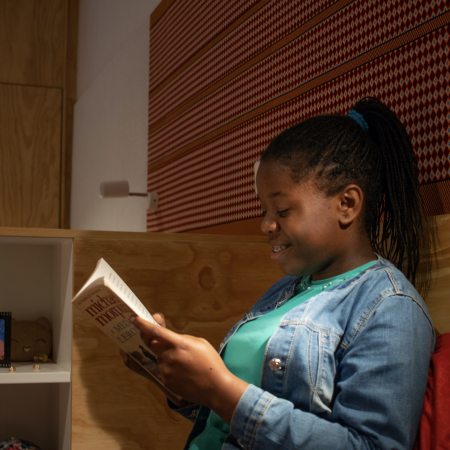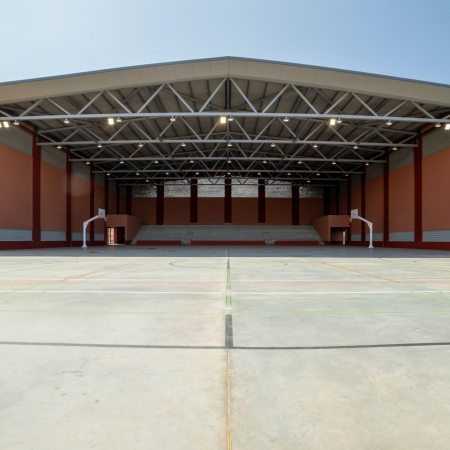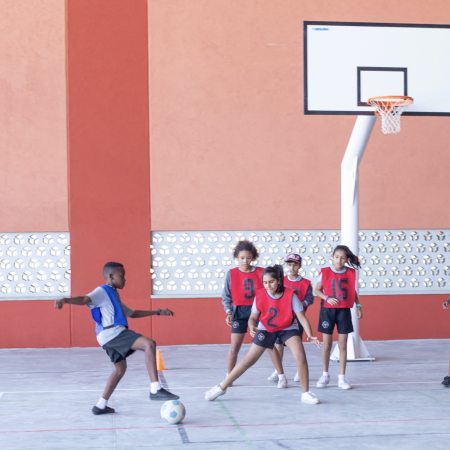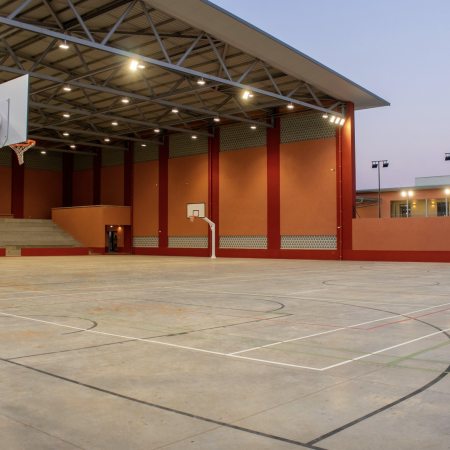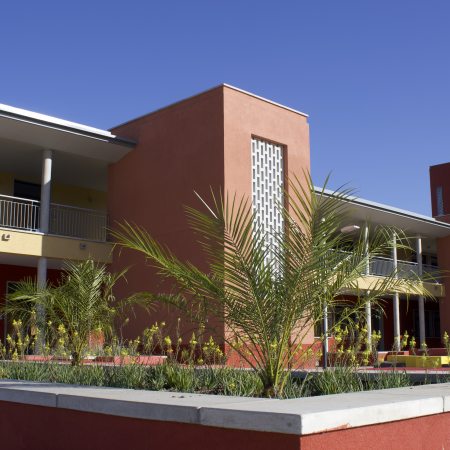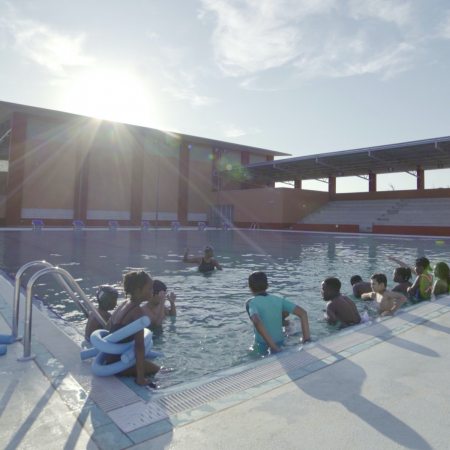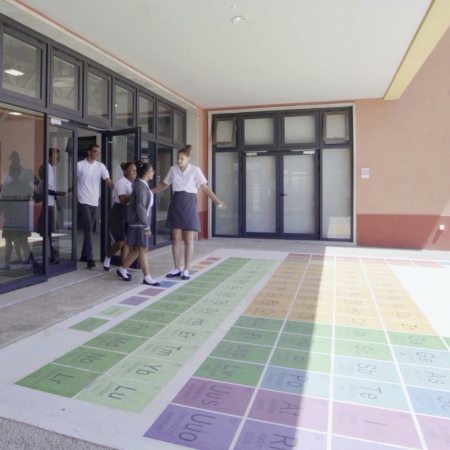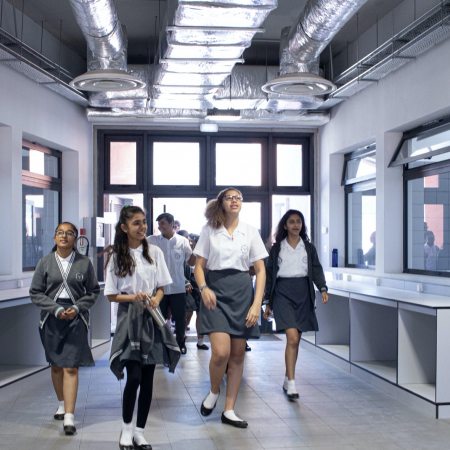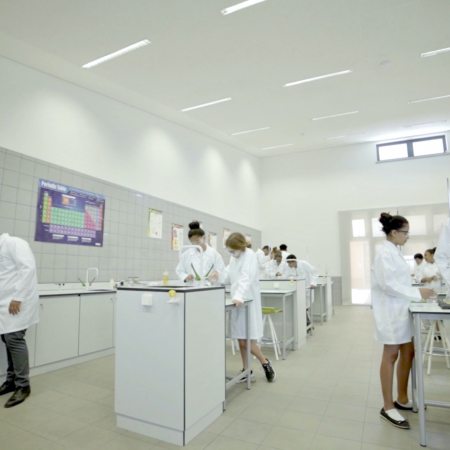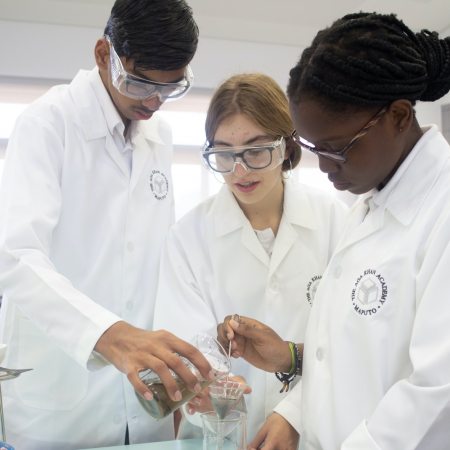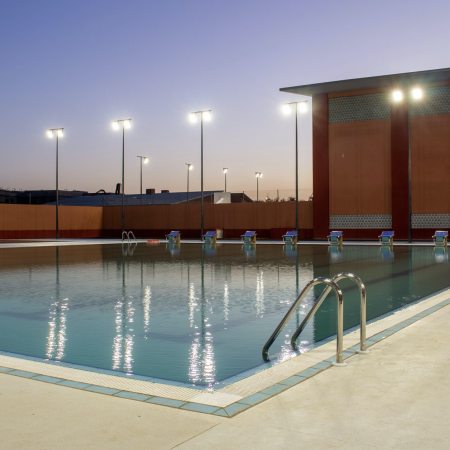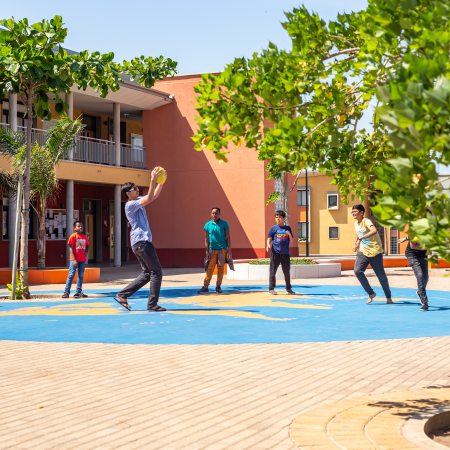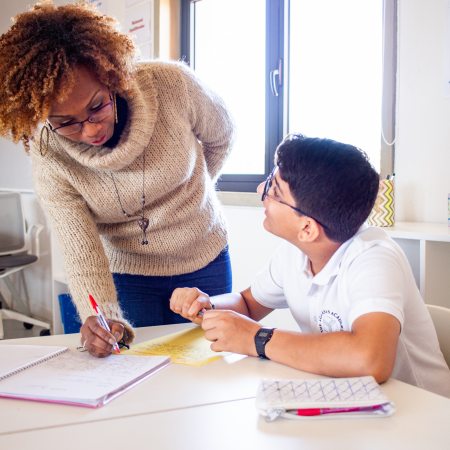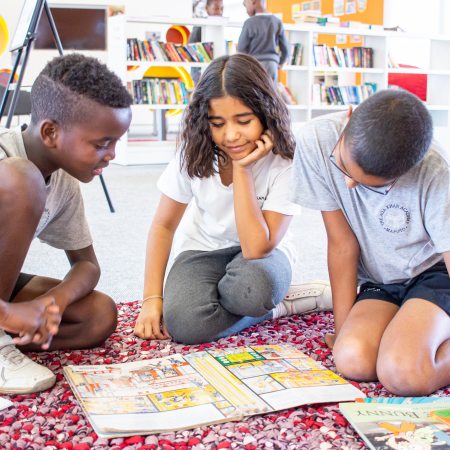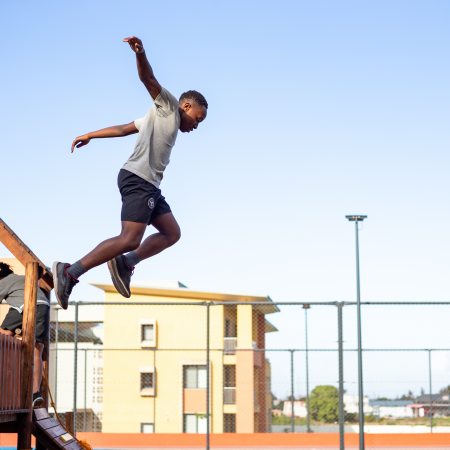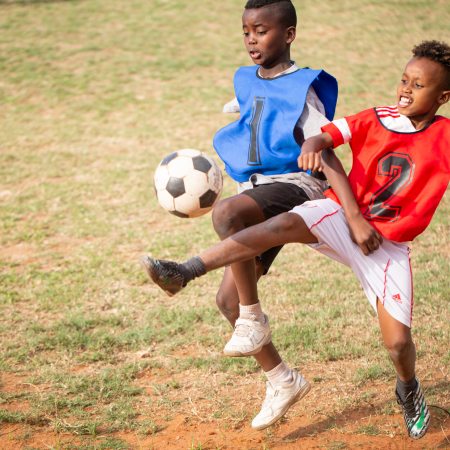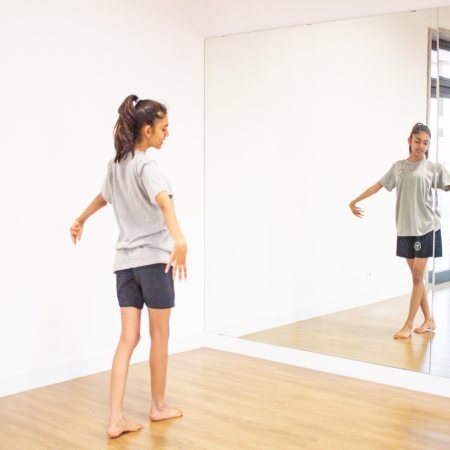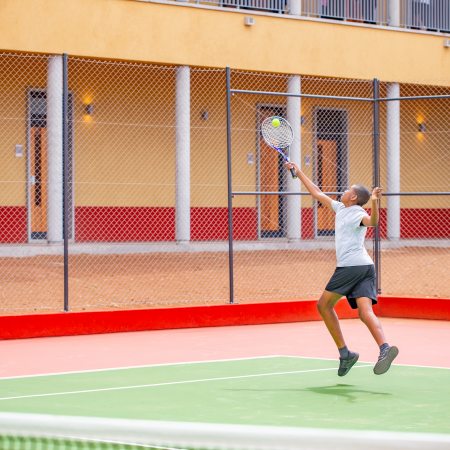Rahim Daya (Class of 2013): Grateful for a balanced education
Growing up in London, England I had no idea that I would owe my intellectual and character development to the dynamic academic and residential programmes at the Aga Khan Academy Mombasa.
I was aware of the work of the Aga Khan Development Network and their efforts to improve the quality of life of communities across the globe, but little more. After moving from London to Moscow at age 12, my parents urged me to consider the programme at the Aga Khan Academy Mombasa, a school 5000 miles away. I was taken aback. Why did they want to send me away? I didn’t mean to knock over the photo frame while kicking around the soccer ball the other day. As I began to read about the Academies and their vision to create leaders, I became excited at the prospect of being part of a rigorous academic programme while having the opportunity to engage in the numerous extra-curricular activities the Academy in Mombasa had to offer.
I was one of the first members of the boarding component of the Academy and, as a result, I saw the programme grow from about 30 students living in two blocks to almost 200 across six blocks. Despite the growth, residential students remained a tight-knit community where younger students felt comfortable interacting with student several grades above them. The commitment to serve the community was of the upmost importance within residential life at the Academy. I recall taking part in cleaning Mama Ngina Drive, the street that ran adjacent to the school, as well as numerous beach clean ups, painting a local madrasa and facilitating a de-worming programme in Bombolulu to name a few. Students were also given the freedom to create their own community service projects. I was a part of a project called Your Environmental Voice, an organisation that aimed to create awareness of environmental issues and undertake initiatives to curb unnecessary pollution in Mombasa. Projects like these allowed for students to lead and take ownership of projects that made a difference in the lives of those around us.
Within the residential programme, I recall the efforts of teachers like Mr. Bernard Dudi – my dorm parent for the majority of my time at the Academy – and others who went out of their way to ensure that students quickly settled into the Academy. Teachers’ doors were always open for a quick chat on academics, current affairs and future plans as well as the results from the previous nights’ Champions League football. In holding the position of dorm captain within the residential community and representing the community on the student council, I was entrusted with a leadership role within residential life that involved organising and facilitating orientation programmes for new students. In addition, dorm captains arranged activities for students on the weekends and liaised with students and teachers to improve the boarding experience for all. Leadership roles like this gave me my first taste of managing projects and people and I continue to draw on these experiences today.
Being a part of and leading the Model United Nations club at the Academy in Mombasa was an experience that I hold most dear. At first, the thought of public speaking and writing resolutions to combat real local, regional and international problems was intimidating enough for me to turn a blind eye to joining the club. However after encouragement from teachers and peers, it wasn't long before I began to gain confidence in addressing long hundreds of fellow delegates without needing to read off a script or feel my legs wobble. Through attending conferences as well as teaching others the skills needed to be a successful delegate, I was tasked with analysing and working with others to construct creative solutions to tackle issues concerning poverty reduction including food security; the prevalence of quality educational institutions; access to clean water and sanitation. These experiences allowed me to begin to comprehend the multiple complexities to a single issue and the ethical responsibility we carry to do all in our power to promote sustainable progress in less privileged communities.
I was particularly challenged by the rigor of the IB Diploma Programme – I quickly learnt that it is essential for students to be able to think independently and work hard to engage with thought provoking course work. Studying six different subjects as well as Theory of Knowledge and writing a 4000-word essay on a chosen topic was a heavy load to bear. Crucially, there was a willingness and determination among the student body to study in groups and push one another to achieve challenging objectives. There was no shame in going to a classmate or more senior students to ask for help and this was in fact commonplace. I think that the challenge of the IB diploma was made much easier by the effort to work together among students. The teachers at the Academy were invaluable in the process as they guided students to reach the academic goals and encouraged students to think outside the box. Their collective love for teaching and determination to see students succeed allowed for the attainment of consistently high grades and development of a passion for learning that continues to drive Academy alumni today.
As I reflect on my time at the Academy and turn an eye to the future it is my hope that I will be able to return to the African continent and help to contribute to the progress being made today. Graduating with a liberal arts education from UC Berkeley and focusing on Political Economy from an African lens has cemented the responsibility I feel to give back to communities and help improve the lives of those troubled by poverty, unemployment and poor governance. Not only did my time at the Academy help me gain admission to a top university but it helped me to grow to be the man I am today by instilling values of social conscience and intellectual curiosity that I continue to hold precious today.
By Rahim Daya
Junior School Awards Ceremony
Khushboo Shah (Class of 2016): Using artistic talents to connect with others
Khushboo Shah is an aspiring writer, visual artist, and the current alumni representative of Aga Khan Academy Hyderabad 2016 batch. She is a recipient of The Aga Khan Youth Award for Excellence, and plans to begin her undergraduate studies this fall.
In August 2014, I migrated from my hometown Goa, India and traveled to the Aga Khan Academy (AKA) in Hyderabad to begin my International Baccalaureate education. In retrospect, AKA Hyderabad taught us all how to be independent in our own unique way. It strengthened my intellectual roots and taught me that it is okay to question. And because I questioned, I was able to learn.
At the Academy, I ardently loved studying English, history and visual arts – they groomed me to be a principled thinker and ethical person. The Academy under the vision of His Highness the Aga Khan does an excellent job of grooming each one of us to be a risk taker and a leader. Prior to joining the Academy, I was always interested in visual art, but I did not know how to pursue my passion. Under the apt guidance and encouragement from my art teachers, I learned how to weave my passion for history and literature into art. I also received an opportunity to present my artwork to the Premier of Ontario, the Honourable Kathleen Wynne, on her visit to the Academy in Hyderabad in early 2016. The Academy’s brilliant framework allows each individual student to pursue his/her inner talent and vision. I had always wanted to develop my writing and leadership skills, and I was able to do so by serving as the editor of the Academy’s 2014-2015 Yearbook. I also served as the elected Student Council President for the 2015-2016 year. Serving as an editor gave me confidence to take my writing seriously, while being a student leader allowed me to become a responsible and thoughtful individual.
In January 2017, I was awarded the Aga Khan Youth Award for Excellence, which has humbled me and allowed me to believe that with the right balance of determination, hard work and guidance, an individual can achieve immensely. I also serve as the alumni representative for the Class of 2016. I believe that because of the Academy’s presence in my life, I have truly been able to strive towards my goals. From April 2017 to June 2017, I interned at the Naryn campus of the University of Central Asia (UCA) in Kyrgyzstan. When I was in Kyrgyzstan, I experienced the overlapping of multiple cultures, faiths, nationalities, and ideologies. I was able to share meals and go trekking with more than eight nationalities at once! My circle now includes friends from Kazakhstan, Tajikistan, Kyrgyzstan, Pakistan, Afghanistan, Canada and the United States, making me extremely grateful for all my experiences and encounters.
At UCA, I was also required to assist with Student Life activities and other administrative work. Along with the University Counselor and other Student Life team members, I planned the cultural excursion to Lake Issyk Kul; and under the guidance of the Student Life team, I also organised the Hakuna Matata festival, which was organised partly on the Easter weekend as an arts and craft night, and as an Amazing Race all across Naryn town. Never before had Naryn seen such a race where the students were asked to complete tasks like building sand castles by the river, wearing traditional Kyrgyz clothing, competing against other teams over the game of foosball and conducting interviews with local people. All students were given a budget through which they had to complete their tasks. Students had to take cabs, the ‘mashrutka’ (local bus), or share a ride to reach into town. The race was a great experience as the students were not only challenged to try new things, they also learned to enjoy working collectively in teams. All the leadership qualities which I had acquired at AKA Hyderabad helped me to positively lead this activity. I believe that the Academy’s dynamic vision has allowed me to believe in my imagination, passion and curiosity while pursuing ambitious projects.
His Highness the Aga Khan emphasises that for one to become a global citizen, one must be multilingual. In Kyrgyzstan, I picked up some Russian, and thus was able to communicate a little with the local citizens – once on a taxi ride back from the local bazaar, a local lady whom I had never met before, moved me as she invited me to her house for lunch! That day I understood how by trying to speak the local language, I was not only learning a new skill, but was also breaking the barrier between myself and local citizens, and in a broader perspective – between two communities. Furthermore, on helping the UCA students to organize the first ever TEDxUniversityofCentralAsia, I truly understood the importance of embracing the diversity of different cultures as the event saw the coming together of over nine nationalities, and this collaboration truly humbled me.
When I look back at my Academy years, I often feel humbled and nostalgic. The time spent amidst those red bricked walls, with lovely friends and extremely supportive teachers has been one of the best times in my life. I have realised that an individual can continue to grow, learn and excel throughout their life. I am extremely grateful for the wonderful education I have received – it has been my sincere effort to try and improve in everything that I do by striving to become a more resilient and grounded person.
By Khushboo Shah
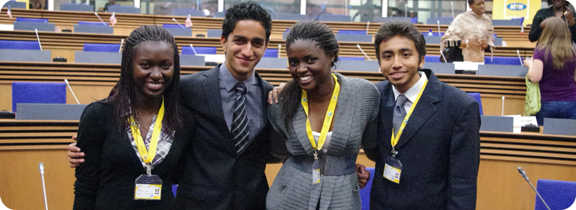
Student Leadership
The Academies’ programmes aim to develop students who are ethical, public-minded and who possess a pluralistic outlook. Both curricular and co-curricular activities work to educate effective home-grown leaders who are actively engaged in their local communities and are aware of the implications of their actions. Through their participation in co-curricular clubs, students are encouraged to take on leadership positions in a variety of different forms (e.g. house leaders, student council, team captains, dorm duties).
Not only do these opportunities provide an environment to explore and enhance skills such as cooperation and problem solving, they also enable students to set personal goals and challenge themselves.
Student leadership activities vary from community service opportunities to sports and expressive arts. Students have opportunities to participate in the Student Representative Council and other similar activities.
Leadership activities instil in participants a sense of community ownership, creativity and a collaborative spirit, and prepares them for a lifetime of active engagement and leadership.
"The conviction that home-grown intellectual leadership of exceptional calibre is the best driver of a society’s destiny, underpins the Ismaili Imamat’s endeavour to create catalytic centres of educational excellence."
Rising Beyond: Inspiring Debate at the MUN
The simulation opened with an aesthetic dance performance showcasing culture that exists in great depth, as well as having Birad Yajnik speaking about global citizenship and leadership. The opening ceremony was followed by the first session of this simulation which consisted of students prepared for heavy debate.
The first session was preliminary and introduced the agendas and topics of debate of each committee to all the delegates. DISEC (Disarmament and International Security Committee) was engaged in debating over the international intervention in Civil Wars; ECOSOC (Economic and Social Council) debated over the impact of science, innovation and technology in achieving the millennium development goals; the JCC (Joint Crisis Committee) went back into history and debated over issues concerning World War II; and lastly, we had the Press Corps which interacted with each committee and their delegates of the conference, and got intensely rooted in the simulation, in order to provide for a very holistic experience of the whole event that took place.The second day still carried on with the same passion and enthusiasm. The second session started off with a morning crisis update, which proved to be quite a surprise to all the delegates. However, the debates in each committee over the crisis initiated slowly, and later escalated into deeper and effective discussions. The Press were involved in initiating Crisis in each committee which proved to be operative as it provoked heavy debates and discussions, further on the day. The second day proved to be an ecstatic and progressive one as it stimulated every mind, which resulted in exciting preparations for resolutions for the last day. The Delegate Dance was of course one of the highlights of the second day of the simulation.
Eventually came the final day of the simulation. The day proved to be brief but tense as delegates of each committee had to come up with effective resolutions according to their agendas. Every committee except for JCC (as it was historical) and DISEC succeeded in coming up with resolutions. Although DISEC failed to pass a resolution, it still instilled the sense of intrigue, passion and enthusiasm to overcome problems that are faced on the surface of the planet – each day and every moment.After having come up with a variety of resolutions, the time for closing the simulation had come. This time was much awaited by the delegates as it was also an award ceremony. Titles such as “Best Delegate”, “Outstanding Delegate”, “Best Photographer” and “Best Reporter” echoed the halls of the venue wherein the ceremony took place. After having a hearing of speeches of inspiration and accomplishment by the Security General and the Executive Board, as well as teachers and staff who functioned as a backbone to the simulation; and watching proud delegates walking towards their much deserving awards, came the time of saying a proud goodbye to the Aga Khan Academy, Hyderabad’s second edition of the Model United Nations conference. Now awaits the third edition which shall happen in Fall, 2015.
By Akanksha Dev
Naheed Bardai's closing remarks at AKA, Mombasa's Class of 2015 graduation
The Cabinet Secretary of Education for Mombasa County, Mr. Tendai, Dr. Bentil, Mr. Bhatia, Mr. Otieno, Graduates, Parents, faculty and invited guests, thank you for taking the time to grace this occasion.
Dr. Bentil, thank you for your inspirational words and guidance, especially towards our graduates.
Joshua, thank you for your insights into the operations of our graduating class, including the things we didn’t – and I’m not sure I really wanted to know!
It is now my pleasure to present the The Aga Khan Academy Award of Excellence. The Aga Khan Academy Award of Excellence is given to the most outstanding male and female student in DP2 each year. This award is given to the top overall male and female contributors to academics and student life, and who best exhibit the AKA Learner Profile upon graduation in DP2. The award considers students’ achievements and contributions in DP1 and DP2. I will start with the female recipient.
Courageous, charismatic and pluralistic, the female recipient of the Award is a role model student. Academically, she is an inquirer with an insatiable thirst for knowledge. With a community-driven outlook and approach, she has managed to find the right balance in pursuing activities that benefit the community while also enabling her to grow. As an accomplished scientist, she earned a gold medal in an international science competition presenting her innovative low-cost water purifier that she carried through from her MYP Personal Project. As a celebrated artist, she has organized dance recitals and written and acted in her own play. Having recently suffered from a difficult illness prior to and during the examination session, she demonstrated the heart and resilience of a true leader. Next year, she will be pursuing her passion in Theatre at New York University in New York on a full tuition scholarship. Please join me in congratulating this year’s female recipient of the Aga Khan Academy Award of Excellence, Karishma Bhagani.
Passionate, socially conscious, and scholarly, the male recipient of the Award is one of the most inspiring students I have had the pleasure of working with. The owner of a true growth mindset, he is never satisfied with the status quo and is always looking to better himself in every way. His deeply held belief in equity and social justice manifest itself in all that he does. Coming from modest means and part of our Talent Identification programme, his humble and unassuming style makes him approachable and an inspiration to all, making us believe that one can overcome life’s obstacles. In many ways, this young man has been the maker of his own destiny. A dedicated researcher and scientist, this student completed his Extended Essay in World Studies looking at the relationship between agricultural productivity and household income in his local community. In addition, he placed third in an international science competition for his work in creating a generator that could produce 50 watts of clean energy using magnets. A former Student Representative Council executive member and current Dorm Captain, he has been a big brother to many. Receiving a full Mastercard Scholarship to study engineering at the University of Toronto, please join me in congratulating this year’s male recipient of the Aga Khan Academy Award of Excellence, Maxwin Ojwang.
Graduates, you have just conquered one of the most important rites of passage – sitting for two hours without sending a tweet, making a comment on Facebook or posting a picture on Instagram. Parents, this is clearly evidence that your sons and daughters are capable of unplugging while at home over their much deserved break. Graduates, you will soon have the chance to get caught up on all of your favourite series, play video games until your fingers fall off, and watch viral videos of strange animals doing strange things. You deserve this break, just as you deserve this ceremony in your honour. Just yesterday, these graduates surmounted a real milestone – their IB examinations. Graduates, I have seen you study harder than any other cohort I have known; I have seen you band together as colleagues and friends to support one-another in times of need; I have seen the joy on your face when you open that exam script and see the exact question you were hoping for; I have seen you curse those exact same exam papers; and as a class, I have seen you consume the most amount of coffee and sugar of any graduating class. Graduates, this is one of many rites of passage that you will undergo in your life. And as you go off to be a leading economist or entrepreneur who helps to find a way to bridge the poverty gap or solves Greece’s economic crisis, or that innovative scientist or engineer who finds a solution to our most pressing health or energy concerns, or that artist who helps us to reflect on our own identity, or that politician striving to create a more inclusive society – be humble and be brave. Be humble and be brave.
The greatest challenge that I believe you will face is not writing that university exam, getting that dream job, or finding a partner – the greatest challenge you will face will be challenges that test your moral compass – that test your integrity – that test your character. Will you have the capacity to forgive even when someone has let you down or stabbed you in the back? Can you have the patience and intellectual humility to invite multiple points of view, even if they disagree with your own? Will you be a good parent to your child? Will you be a good son or daughter to your parents?
To make matters even more complex in the challenges to your character is our ability to operate ‘in cognito’ online. We can do things through an email, text, tweet or photo that will self-destruct in 5 seconds that we would never dream of doing in person. While this relatively new way of relating to one-another has tremendous potential, we cannot hide behind the anonymity afforded to us so easily through technology, holding ourselves to different ethical standards.
That being said, if the last six years that I have had the privilege of working with many of you are anything to go by, I know that your moral compass is strong. Having spent a significant amount of time with all of you, I trust that the future of our communities and countries are in very capable hands.
Ladies and Gentlemen, these graduates are stars and are outstanding in so many ways. 9 of them helped to form our first Year 1 class in 2003, and many more have joined along the way. This cohort formed our first residential group in 2009, and marked the beginning of our robust Talent Identification and Financial Aid programmes. These graduates were the first to go through our mentorship and leadership programmes in 2011, and formed our largest ever Diploma class in 2013. Your combination of intellectual fervour, pursuit of social justice, excellence in athletics, creativity in the arts and inspirational leadership has left an undeniable mark on this school. Indeed, your success is all of our success, and other than your parents, there is nobody more proud of your accomplishments than your teachers. From the PYP to MYP and DP, these inspiring educators have helped to nurture your creativity, sharpen your critical thinking, develop your passions, and hone your moral compass. Graduates, please join me in thanking all of your teachers. I would like to thank all of those who have helped along the way – the nurses, kitchen staff, IT department, maintenance teams, drivers, admin staff and librarians. Without you, none of this would be possible.
To conclude, I would like to quote His Highness The Aga Khan from a recent speech he made in Nairobi at the Aga Khan University graduation. He said, “This is not a Farewell Ceremony. In fact, an event like this is often called a “Commencement”, since it marks the beginning of so many great new stories. We hope that you too will share your stories with us, in the days ahead.” On that same note, I would like to acknowledge and thank our many alumni who have joined us today for this ceremony.
Once again graduates, we wish you well and congratulations. Thank you.
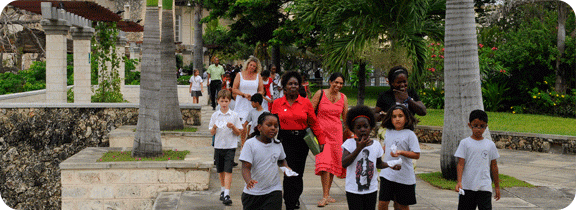
Financial Assistance
Admission to the Academy is based on merit and is means-blind. Students from all socio-economic backgrounds who satisfy the requirements for entry are encouraged to apply.
Partial to full financial aid is available to accepted students with a demonstrated need. However, the Academy cannot guarantee that all applicants will be awarded financial aid. Financial aid awards are reviewed annually and renewed only after reassessment of financial need. Financial aid is mainly for Kenyan nationals but a small number of students from other countries in East Africa have received partial awards.
For information about admission, scholarships and financial aid please contact the admissions office.
IAYP trek – Friday 3-Sunday 5 Feb ’17
52 students from grades 8-10 are going on a trek to Bellum Caves and Mahanandi to fulfil one aspect of the mandatory requirements for the International Award for Young People.
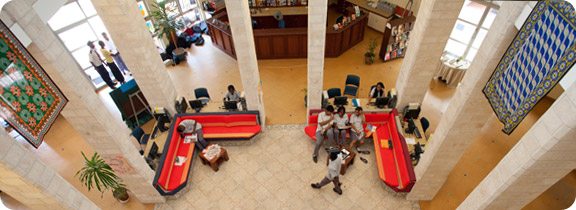
Articles of Interest
The articles listed below have been drawn from the Aga Khan Academies newsletter. They include feature stories and information on aspects of the Aga Khan Academies programme.
Subscribe to the Aga Khan Academies newsletter
Campus Photo Gallery
The Aga Khan Academy Maputo's expansive 22-hectare campus is being purpose built to provide world-class facilities for the students and staff in Maputo, Mozambique.
